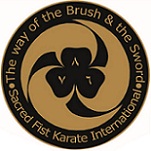Kokondo is a closed system: students are
expected to not train in any other martial arts. The focus of the two arts
is on effective, realistic self-defense. Kokondo-ka (Kokondo practitioners)
are discouraged from engaging in martial arts tournaments; it is Arel's
stance that training for tournaments is disruptive to self-defense training.
The seven codes of Bushido (benevolence, courage, honor, justice, loyalty,
politeness, and veracity) are considered particularly important ideals for
Kokondo-ka, in their karate & jujitsu as well as in their behaviour while
training, and also their behavior generally.
Kokondo dojo are usually run by volunteer sensei, though there are
exceptions. The IKA rejects the practice of student contracts, and attempts
to retain students through excellence of instruction. Kokondo welcomes
women, and has equal expectations of both female and male kokondo-ka. |













